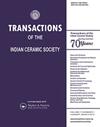Influence of the SrO Insertion to a Binary PbO-B2O3 Glass System: Mechanical Properties and Radiation Shielding Study
IF 1.5
4区 材料科学
Q3 MATERIALS SCIENCE, CERAMICS
引用次数: 0
Abstract
Mechanical features have been investigated to the glass system with the chemical composition xSrO-10PbO-(90–x)B2O3 with various concentrations of x = 20, 25, 30, 35, 40 and 45 mol%. Based on the Makishima-Mackenzie model, the elastic modulus has been predicted for the SrPbB glasses. The obtained results illustrate that elastic moduli reduced with the addition of SrO concentrations in the lead borate glass. The highest values of Young’s (89.03 GPa), bulk (68.36 GPa), shear (4.69 GPa), and longitudinal (114.63 GPa) moduli have been detected in the SrPbB20 glass with 20 molar fraction of SrO and low density of 3.29 g.cm−3. The radiation shielding properties have also been studied for the discussed glasses. Among the shielding parameters, the transmission factor and the mean free path have been detected according to the linear attenuation coefficient values which have been simulated utilizing the Monte Carlo simulation code MCNP5. Successively, the exposure buildup factors and the energy absorption buildup factor have been predicted using the BXCOM programme to appreciate the photons accumulation inwards the studied glass material as well as the effective atomic number (Zeff ) and the equivalent atomic number (Zeq ). Finally, it has been concluded that the present synthetical glasses are preferred to be utilized in various radiation shielding applications. GRAPHICAL ABSTRACTSrO插入对二元PbO-B2O3玻璃体系的影响:机械性能和辐射屏蔽研究
研究了不同浓度x = 20、25、30、35、40和45 mol%的xSrO-10PbO-(90-x)B2O3玻璃体系的力学特性。基于Makishima-Mackenzie模型,对SrPbB玻璃的弹性模量进行了预测。结果表明,硼酸铅玻璃的弹性模量随着SrO浓度的增加而降低。在SrO摩尔分数为20、密度为3.29 g.cm−3的SrPbB20玻璃中,杨氏模量(89.03 GPa)、体积模量(68.36 GPa)、剪切模量(4.69 GPa)和纵向模量(114.63 GPa)最高。对所讨论的玻璃的辐射屏蔽性能也进行了研究。利用蒙特卡罗模拟程序MCNP5模拟了屏蔽参数中的线性衰减系数值,并根据线性衰减系数值检测了传输系数和平均自由程。随后,利用BXCOM程序预测了暴露积累因子和能量吸收积累因子,以计算所研究的玻璃材料的光子积累以及有效原子序数(Zeff)和等效原子序数(Zeq)。最后得出结论,本发明的合成玻璃在各种辐射屏蔽应用中具有较好的应用前景。图形抽象
本文章由计算机程序翻译,如有差异,请以英文原文为准。
求助全文
约1分钟内获得全文
求助全文
来源期刊

Transactions of the Indian Ceramic Society
工程技术-材料科学:硅酸盐
CiteScore
2.40
自引率
8.30%
发文量
12
审稿时长
2.3 months
期刊介绍:
Transactions of the Indian Ceramic Society is a quarterly Journal devoted to current scientific research, technology and industry-related news on glass and ceramics. The Journal covers subjects such as the chemical, mechanical, optical, electronic and spectroscopic properties of glass and ceramics, and characterization of materials belonging to this family.
The Editor invites original research papers, topical reviews, opinions and achievements, as well as industry profiles for publication. The contributions should be accompanied by abstracts, keywords and other details, as outlined in the Instructions for Authors section. News, views and other comments on activities of specific industries and organizations, and also analyses of industrial scenarios are also welcome.
 求助内容:
求助内容: 应助结果提醒方式:
应助结果提醒方式:


